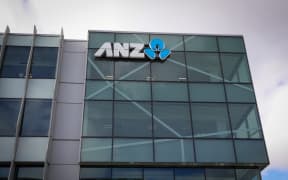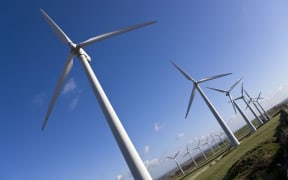
Julie Anne Genter says record profits are being made from basic items many New Zealanders are struggling to afford. Photo: RNZ / Dom Thomas
The Green Party says many supermarkets, fuel retailers, power companies, and banks are not paying their fair share of tax.
The party's finance spokesperson Julie Anne Genter has called for a new windfall tax on excess profits made by major corporations.
She said the sectors making record profits were the same ones in which New Zealanders were struggling with the cost-of-living crisis - such as buying food, fuel and energy and paying for mortgages and rents.
The tax would apply during periods when people struggled to make ends meet, such as a similar scheme put in place after the World Wars.
It would target the top 20 companies operating in the supermarket, banking, construction, energy and petroleum sectors, which had benefited from external factors like global inflation and the government's pandemic response.
A discussion document from the Greens said concerns about reduced business investment could be addressed using tax incentives to encourage investment in important emissions reducing infrastructure or public benefit research and technology.
Genter said the current system was unfair and the Greens were offering two different systems that could be used to calculate the excess profits.
She referred to the Commerce Commission report that supermarket operators were making excess profits of $1 million a day.
There were cost pressures on businesses such as the government response to the pandemic, the war in Ukraine and supply chain problems.
"We know those higher costs can't be flowing through to those sectors at the same rate that they're raising their prices because they're making record profits and we're talking hundreds of millions or billions of dollars."
If the corporate tax rate was raised to 33 percent that would raise about $3 billion a year, which could be invested in insulation retrofits for houses, free public transport, and more support for struggling households.
Genter said many countries were introducing windfall taxes and there was little danger targeted companies would decide to leave because they would still be making money.
"We're talking about 20 big corporates and ultimately they need to help pay their fair share towards the rest of New Zealand.
"They're going to benefit from that - from New Zealanders being able to make ends meet.
"Ultimately these companies are benefiting from things the government invests in, like infrastructure and public services and it's fair to ask them to contribute more...
"Wealth inequality is getting worse and the very wealthiest people and big corporates have profited the most from the government response to the pandemic."
New Zealand's corporate tax rate is 28 percent, which is well down on 1987, when it was above 40 percent before being steadily reduced to 33 percent in the 1990s and 2000s and then to 30 percent in 2008, before dropping to the current level in 2010.
That compared to Australia's corporate tax rate of 30 percent, 21 percent in the United States, 17 percent in Singapore and 12.5 percent in Ireland.
Both Prime Minister Jacinda Ardern and Finance Minister Grant Robertson have said they did not favour a windfall tax.
Ardern told Morning Report that most countries that have introduced windfall taxes have large oil and gas companies which were reaping the benefits of high energy prices at present.
However, Genter said it was surprising that Robertson would not support a fair way to raise more revenue.
Windfall tax could turn investors off, business figures say
BusinessNZ chief executive Kirk Hope said windfall taxes were difficult to administer and did not raise much revenue.
"I think [it] would be more harmful than good," Hope said.
"Those taxes which were used in New Zealand after the World Wars weren't popular and they didn't make much revenue, and the companies simply had to pass the costs on to consumers."
New Zealand would need to be competitive with Australia to continue to attract foreign investment, he said.
Chartered Accountants Australia and New Zealand (CAANZ) tax leader for New Zealand John Cuthbertson said a piecemeal approach to tax policy was problematic.
"You don't discount anything out of hand, but I think you'd want to work it up properly and we would favour certainly looking at it from a whole-of-tax system perspective, rather than trying to single out a few taxpayers because it can be quite subjective, quite ad hoc, and I think fraught with some difficulties on occasion," Cuthbertson said.
"Businesses crave certainty and understanding - both the tax system and also the system in terms of how we operate as a country.
"I think once you start floating some of these ideas, that has the potential to impact foreign investment because you know, people do take notice of these things."







